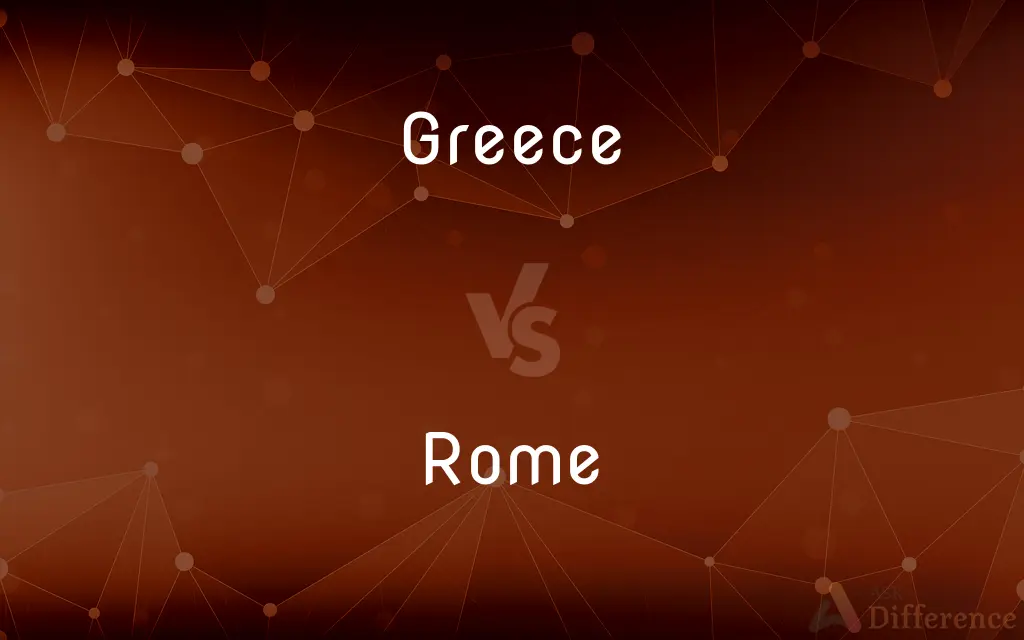Greece vs. Rome — What's the Difference?
By Tayyaba Rehman — Published on December 4, 2023
Greece is a southeastern European country with ancient city-states; Rome is the capital of Italy and once the center of the Roman Empire.

Difference Between Greece and Rome
Table of Contents
ADVERTISEMENT
Key Differences
Greece, situated in southeastern Europe, has a rich history dating back to ancient times. It's known for its influential city-states like Athens and Sparta. On the other hand, Rome, located in the Italian peninsula, emerged as a powerful city and eventually became the heart of the vast Roman Empire.
While Greece is renowned for its classical era, introducing democracy, philosophy, and drama, Rome is recognized for its empire, which at one point controlled vast territories from Britain to North Africa. Both played pivotal roles in shaping the Western world, with Greece laying foundational cultural and intellectual stones and Rome expanding and solidifying them through conquest.
Greece's artistic contributions, such as sculptures and architecture, focus on idealism and perfection. Rome, while influenced by Greek art, introduced a more practical and representative style, capturing reality and imperfection. Both regions, however, have significantly impacted art and architecture that resonate even today.
Language forms another distinctive difference. Ancient Greece primarily used the Greek language, which birthed the New Testament of the Bible and many scientific texts. Rome, conversely, communicated in Latin, which later evolved into the Romance languages and deeply influenced modern legal, scientific, and religious lexicons.
In essence, Greece and Rome, while geographically close, have distinct histories, cultures, and contributions to the world. Greece's legacy lies in its intellectual and artistic innovations, while Rome's strength was in its expansive empire and integration of conquered cultures.
ADVERTISEMENT
Comparison Chart
Location
Southeastern Europe
Central Italy
Historical Significance
Birthplace of democracy, philosophy, and the Olympic Games
Capital of the vast Roman Empire
Language
Greek
Latin
Architectural Style
Idealistic, perfection-focused (e.g., Parthenon)
Practical, representative (e.g., Colosseum)
Major Contributions
Philosophy, theater, mathematics
Engineering, law, Roman Republic and Empire
Compare with Definitions
Greece
A country in southeastern Europe.
I've always wanted to visit Greece for its beautiful islands.
Rome
The capital city of Italy.
Rome is famous for its historic monuments.
Greece
Birthplace of Western civilization.
Greece's ancient ruins tell tales of a glorious past.
Rome
Heart of the Roman Empire.
Rome's influence spread across three continents.
Greece
Home to historic city-states like Athens and Sparta.
Greece was divided into several influential city-states.
Rome
Home to the Colosseum and Roman Forum.
Rome's ancient architecture attracts millions of tourists.
Greece
Cradle of Western philosophy.
Greece is known for philosophers like Plato and Aristotle.
Rome
Origin of the Roman law and Roman Republic.
Rome laid the foundation for modern legal systems.
Greece
Origin of the Olympic Games.
The Olympic Games began in ancient Greece.
Rome
Location of the Vatican City.
Pilgrims from all over the world visit Rome.
Greece
(obsolete) gree
Rome
A variety of apple having round firm fruit with tough red skin.
Greece
See Gree a step.
Rome
Capital and largest city of Italy; on the Tiber; seat of the Roman Catholic Church; formerly the capital of the Roman Republic and the Roman Empire
Greece
A republic in southeastern Europe on the southern part of the Balkan peninsula; known for grapes and olives and olive oil
Rome
The leadership of the Roman Catholic Church
Common Curiosities
What is Greece known for historically?
Greece is known as the cradle of Western civilization, with contributions in democracy, philosophy, arts, and sciences.
Where is Rome located?
Rome is the capital city of Italy, situated in the central part of the country.
How did Greece and Rome influence modern democracy?
Greece introduced the concept of democracy, while Rome added representative elements and legal structures.
What language did ancient Greece use?
Ancient Greece primarily used the Greek language.
Did Rome conquer Greece?
Yes, Rome conquered Greece in the 2nd century BCE, making it a Roman province.
What are the architectural highlights of Rome?
Rome boasts architectural marvels like the Colosseum, Roman Forum, and the Pantheon.
Which culture, Greek or Roman, influenced the Renaissance more?
Both had an influence, but the Renaissance drew heavily from ancient Greek texts and arts.
Was Latin derived from Greek?
No, Latin and Greek are distinct languages, though they share some common influences.
Was Rome's foundation influenced by Greece?
Yes, Rome was significantly influenced by Greek culture, art, and governance.
Are the Greek and Roman gods the same?
They have similarities, but names and certain attributes differ; for example, Zeus in Greece is Jupiter in Rome.
Did the Greek or Roman Empire last longer?
The Roman Empire lasted longer, with its Eastern portion (Byzantine Empire) surviving into the 15th century.
Where did the Olympic Games originate, Greece or Rome?
The Olympic Games originated in ancient Greece.
Which city-state is considered the educational hub of ancient Greece?
Athens is considered the educational and intellectual hub of ancient Greece.
Why is Rome often called the "Eternal City"?
Rome is called the "Eternal City" because of its timeless influence and longevity as a major civilization center.
Which has a more mountainous terrain, Greece or Rome?
Greece has more mountainous terrain compared to the city of Rome.
Share Your Discovery

Previous Comparison
Intracellular Fluid vs. Extracellular Fluid
Next Comparison
Monoprotic Acid vs. Diprotic AcidAuthor Spotlight
Written by
Tayyaba RehmanTayyaba Rehman is a distinguished writer, currently serving as a primary contributor to askdifference.com. As a researcher in semantics and etymology, Tayyaba's passion for the complexity of languages and their distinctions has found a perfect home on the platform. Tayyaba delves into the intricacies of language, distinguishing between commonly confused words and phrases, thereby providing clarity for readers worldwide.
















































